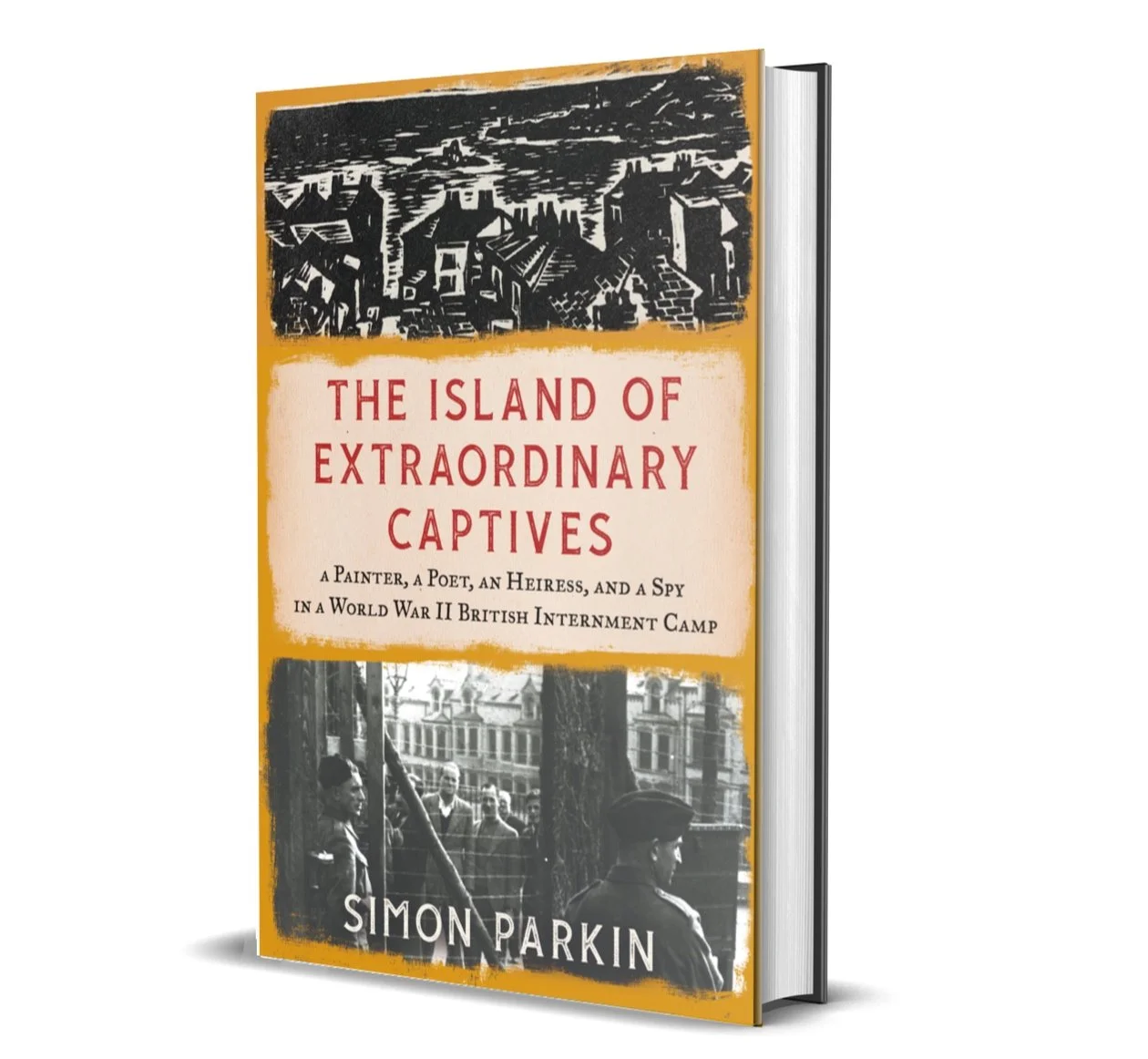THE ISLAND OF EXTRAORDINARY CAPTIVES
WINNER OF THE 2023 WINGATE LITERARY PRIZE.
NEW YORKER BEST BOOKS OF 2022
A NEW YORK TIMES EDITOR’S CHOICE.
“[A] powerful book…vivid, moving.” – Sir Max Hastings, The Sunday Times
“Taut, compelling, impossible to put down.” – The Daily Express
“Insightful, brilliantly written.” – Daily Mirror
Compelling...In this "university of captives", Parkin has unearthed a small and riveting chunk of wartime history, easily overlooked. ― Daily Telegraph
The police came for Peter Fleischmann in the early hours. It reminded the teenager of the Gestapo's moonlit roundups he had narrowly avoided at home in Berlin. Now, having endured a perilous journey to reach England - hiding from the rampaging Nazi thugs at his orphanage, boarding a Kindertransport to safety - here the aspiring artist was, on a ship bound for the Isle of Man, suspected of being a Nazi spy. What had gone wrong?
In May 1940, faced with a country gripped by paranoia, Prime Minister Winston Churchill ordered the internment of all German and Austrian citizens living in Britain. Most, like Peter, were refugees who had come to the country to escape Nazi oppression. They were now imprisoned by the very country in which they had staked their trust.
Painstakingly researched from dozens of unpublished first-hand accounts and previously classified documents, The Island of Extraordinary Captives tells, for the first time, the story of history's most astonishing internment camp and of how a group of world-renown artists, musicians and academics came to be seen as 'enemy aliens'.
The Island of Extraordinary Captives is the story of a battle between fear and compassion at a time of national crisis. It reveals how Britain's treatment of refugees during the Second World War led to one of the nation's most shameful missteps, and how hope and creativity can flourish in even the most challenging circumstances.
US edition.
Extraordinary yet previously untold true story...meticulously researched...it's also taut, compelling, and impossible to put down ― Daily Express
By shining a light upon the government's decision to intern the innocent, Simon Parkin's eye-opening, insightful and brilliantly written book serves as a timely reminder of the dangers of populism ― Daily Mirror
Compelling...In this "university of captives", Parkin has unearthed a small and riveting chunk of wartime history, easily overlooked. -- Anne de Courcy ― The Telegraph
The wealth of primary sources through which Parkin has trawled fill its pages with life; his enthusiasm for his subject fills it with affection. The reader is left with a powerful sense of Weissenborn's verdict on Hutchinson: to turn a prison camp into a university "was a miracle of the human will to live and to work". ― The Times
Meticulously researched ― Literary Review
PURCHASE UK EDITION
PURCHASE US EDITION
A Game of Birds and Wolves
SHORTLISTED FOR THE 2020 MOUNTBATTEN PRIZE.
A NEW YORK TIMES EDITOR’S CHOICE.
"Vivid, engaging” ―The New Yorker
"Compelling” ―New York Times
"Reads like a thriller” ―Wall Street Journal
“History writing at its best" ―Booklist
‘Gripping,’ ―Jonathan Dimbleby.
‘In the dying days of 1941, Winston Churchill came to believe that the outcome of World War II hinged on the Battle of the Atlantic. Nintey-five per cent of Britain’s fuel, and seventy per cent of the nation’s food arrived from overseas via merchant ships, which the German U-boat fleet had been targeting with near-unimpeded success.
If losses continued at the current rate, the country could be forced to surrender within as little as three months. None but a small clutch of senior British politicians and military leaders knew the truth of the situation: the full extent of the U-boats’ success, nor of the failure of the Royal Navy to stave off their attacks.
Churchill invited a forty-one-year-old Naval commander, Gilbert Roberts, in to the secret. Roberts was commissioned to discover the tactical reasons behind the mounting losses. He joined a group of eight WRENS (members of the Women's Royal Naval Service) in Liverpool, and together the newfound unit designed a game to re-stage the sea battles in miniature, in an effort to expose the tactics behind the success of the German U-boats.
Played on a linoleum floor divided into painted sections, model ships were moved across this make-believe ocean in a manner reminiscent of the childhood game, Battleship. Through play, the game designers developed “Raspberry”, a counter-maneuver that helped turn the tide in the Battle of the Atlantic, and proved the revelatory power of wargames.
Combining rich novelistic accounts with extensive research, interviews with surviving Wrens and their families, and previously unpublished accounts — including those found in Captain Roberts’ personal diaries and papers — Simon Parkin details the role that these men and women played in developing the Allied strategy which, in the words of one Admiral, “contributed in no small measure to the final defeat of Germany.”
"Sheds compelling new light on the ferocious struggle being played out in the mid-Atlantic between cocksure German U-boat captains and the convoys on which they preyed." —Giles Milton, The Sunday Times (UK)
"Splendid... a triumph" ―John Lewis Stempel, Sunday Express
"A fascinating story, wonderfully well-told on a little known but hugely important aspect of naval warfare. The characters of the main players, notably the Wrens are beautifully and colourfully put across."―Admiral Sir Michael Layard KCB, CBE, former Second Sea Lord
"Stunning"―Niall Kilgour, CBE, former Rear Admiral, Submarines and President of the Submariners Association
"This is the riveting true story of war, amazing women, and one of the most important games in history. Read it here before some film producer makes a mess of it."―Tom Mouat MBE, Simulation and Modelling Technology School, Defence Academy of the United Kingdom
"A magnificent look at a war game that mattered most: how to out fox the Nazi's dreaded U-boats. Told with poetic mastery, Simon Parkin's A Game of Birds and Wolves unveils the story of Operation Raspberry, how eight young women and a retired naval captain found the key to winning the Battle of the Atlantic on a giant board game played on a linoleum floor."―Annie Jacobsen, author of the Pulitzer Prize finalist The Pentagon's Brain
PURCHASE UK EDITION
PURCHASE US EDITION
Death By Video Game
Serpent's Tail (UK)/ MeLville HOUSE (US).
'Whether it's Space Invaders, Candy Crush Saga or Grand Theft Auto, video games draw us in and don't let go. In Taiwan, a spate of deaths at gaming cafés is raising a question: why is it that some of us are playing games beyond the limits of our physical wellbeing?
Death by Video Game uncovers the real stories behind our video game obsession. Along the way, award-winning journalist Simon Parkin meets the players and game developers at the frontline of virtual extremism, including the New York surgeon attempting to break the Donkey Kong world record; the Minecraft player three years into an epic journey towards the edge of the game's vast virtual world and the German hacker who risked prison to discover the secrets behind Half-Life 2.
Investigating the impact of video games on our lives, Death by Video Game will change the way we think about our virtual playgrounds.'
"The finest book on video games yet. Simon Parkin thinks like a critic, conjures like a novelist, and writes like an artist at the height of his powers - which, in fact, he is." (Tom Bissell, author of Extra Lives and God Lives in St. Petersburg)
"Parkin has a deft sense of the ways that video games appeal to and satiate the longings of the spirit ... Death by Video Game offers an excellent sociocultural study of the 21st century's quintessential art form." (Washington Post)
"The best book about video games ... brainy enough to appeal to even the deepest gamer, and yet accessible enough for the reader who hasn't picked up a controller in years." (GQ)
"A sort of love-letter travelogue [and a] thought-provoking introduction to the fastest-growing religion on the planet." (The Times)
"One of the best writers around on games and games culture ... Parkin's quest for the big picture quickly takes him on to the many ways in which video games are a part of life." (New Scientist)
"The book is rich in personalities ... Parkin is an excellent writer, sensitive and empathetic, at his best when simply talking with people ... for Parkin, games are a safe place to retreat to from a more complicated, dangerous and unpredictable world." (Times Literary Supplement)
"Groundbreaking ... his reportage leads to brilliant, fresh insights ... accomplishing that rare feat of teaching while entertaining, this work ignites a series of debates crucial to the future of video games." (Library Journal)
"Parkin has a literary eye for scenic and investigative detail ... thoughtful, serious criticism on gaming and play." (New York Times Book Review)
"Parkin is a powerful writer ... the prose gleams with enthusiasm and wonder and as far as any book can transport us into these digital worlds, Parkin does so marvellously." (National)







